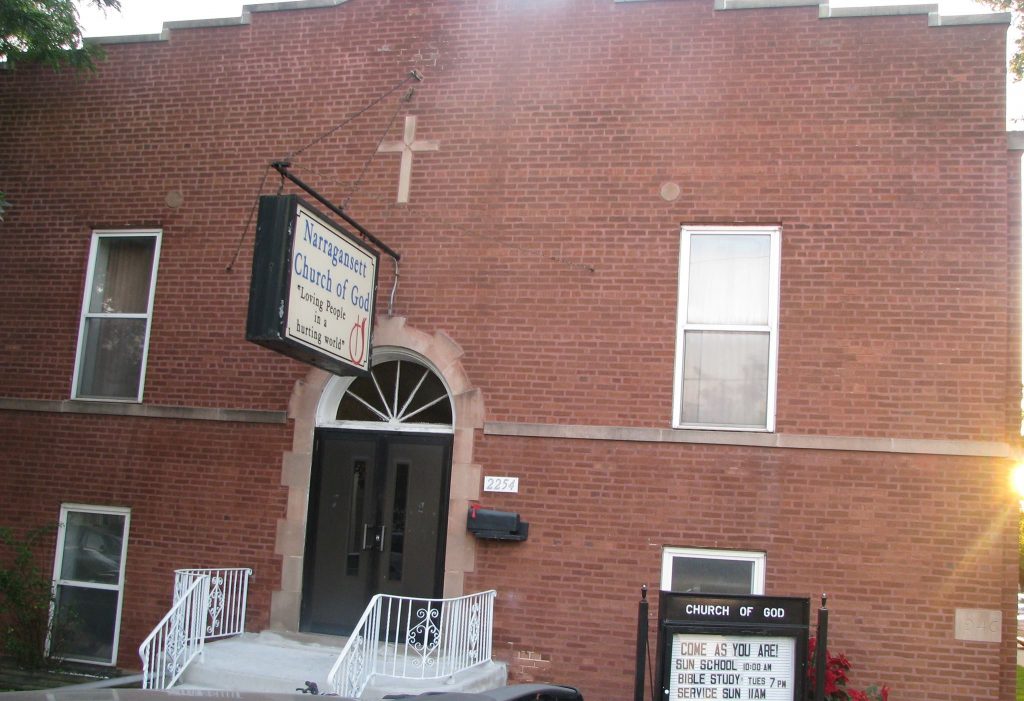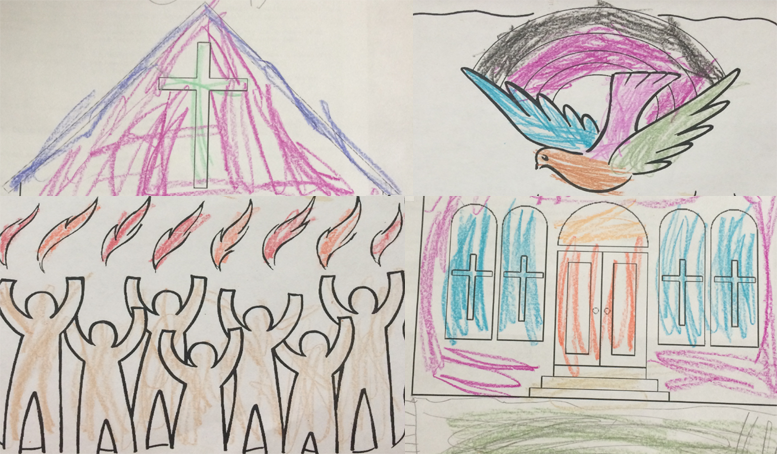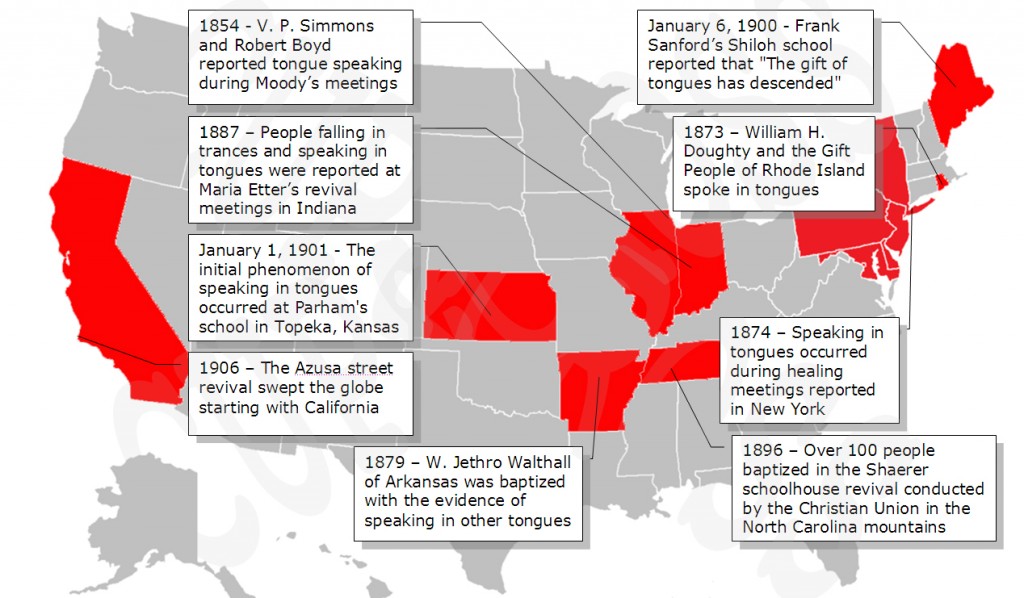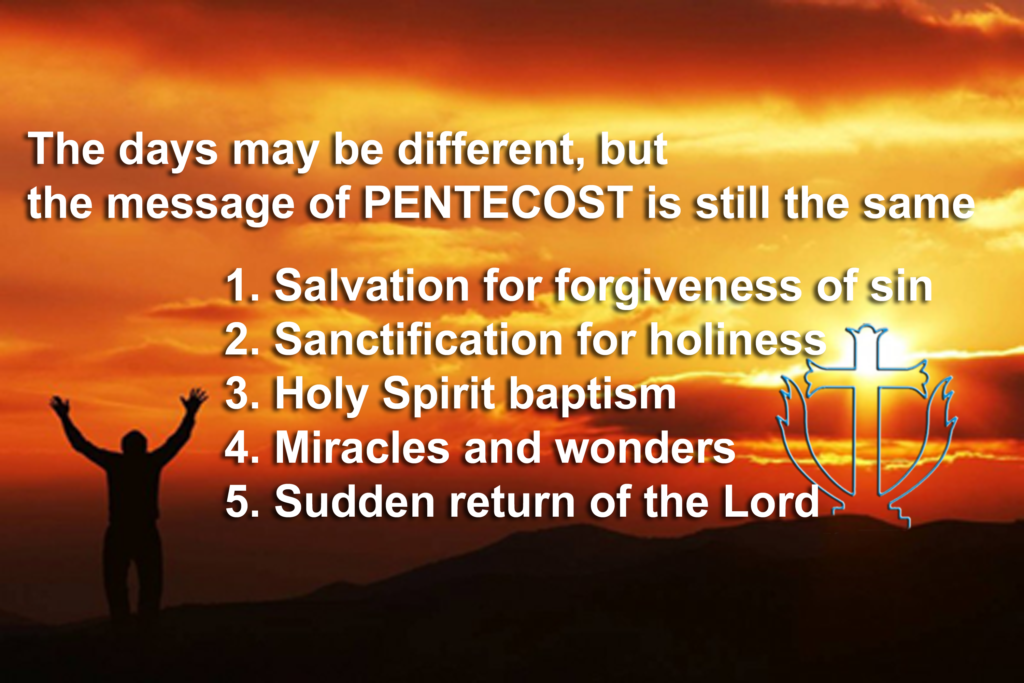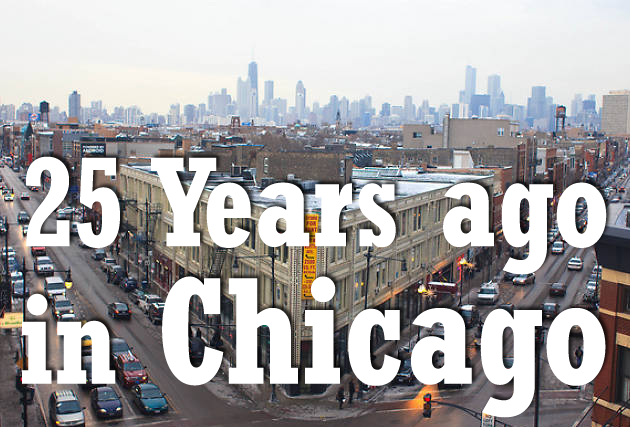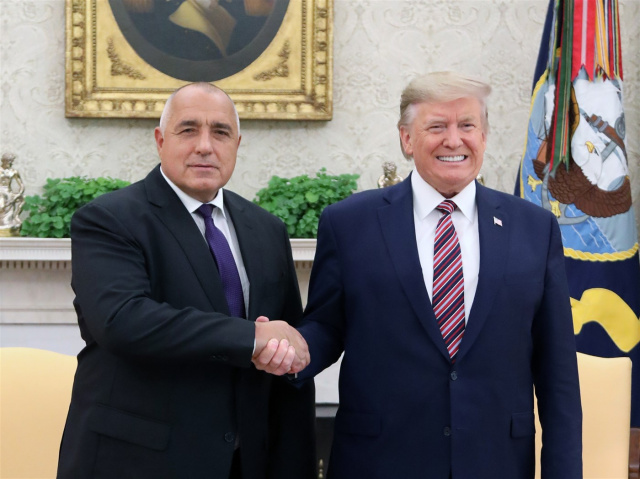A quarter of a century ago in Chicago
I left Chicago on this day 25 years ago (July 30, 1995). The Bulgarian church that day held service at 1 PM with 64 Bulgarians and many other internationals in attendance. Bulgarian students from the neighboring Indiana and Wisconsin attended as well. There was even a Bulgarian family from Alaska.
It was a Sunday. I left Chicago to preach in Beloit, WI that night and then left for Washington, D.C. the following morning. While driving north with quite the speed my Carolina blue Grand National began filling with white smoke. At first, I thought the air conditioner was on its last leg in the hot Chicago summer of 1995, but the air remained strong and cold. The cloud proceeded and it was so sensible that I had to slow down and basically stop on the side of the road. In my 30 years of ministry, I have only seen this one more time – in 2011 when the Glory of God descended over a youth camp we were preaching in the Bulgarian mountains. I did finally preach in Beloit and made it to D.C. the next day, but the vision of the cloud remained with me for the next 25 years.
Meanwhile, the word of mouth had spread and the Bulgarian church in Chicago was growing among the Bulgarian diaspora. On October 7, 1995, I was able to visit the church in Chicago again and present it to the National Overseer of the Bulgarian Church of God, Pastor Pavel Ignatov who visited the Bulgarian congregation in Chicago for the first time. By that time, it has become evident that the initial structuring for growth was giving more than expected results. The church became not only the first officially registered Bulgarian Pentecostal congregation in the United States, but also an important social and educational center able to minister to the 100,000 Bulgarians that live in the Great Lake region today.
Called to another mission, I left Chicago on July 30, 1995. The church bulletin upon my departure under Farewell and Appreciation read: “Today we are saying thank you to Dony for a job well done this past summer. He has served our church faithfully, and has been a tremendous blessing to Narragansett Ministries. Immediately following worship this morning, there is a dinner in Dony’s honor in the fellowship hall. And everyone is invited to attend.” Quiescently, while writing this next book for the quarter century anniversary of the Bulgarian Church in Chicago, I was able to find this last bulletin in a box with several dozen letters I had sent weekly to my parents in Bulgaria. Surprising even to myself, those letters contain pictures, documents, dates, growth charts and progression predictions that are surprising even to me today. I remember spending countless nights in prayer, contemplating and strategizing over the new Bulgarian church plant, but I had forgotten all this was carefully documented as a case study.
The church congregation presented me with a plaque that represented my efforts and work in Chicago, which I have also kept until now. Because this plaque represents the prayers and the vision of many who are continuing the work today, establishing and leading Bulgarian churches around the world to providing pastoral care for many who have left the homeland in search for a better life. To these ministers goes my personal token of appreciation and thanks, “Well done thou good and faithful!” For me personally today a quarter of a century later, this plaque represents one very simply thing – I never betrayed my dreams. And in my book, this is well done…
Preparing to celebrate 30 YEARS in the MINISTRY
Pentecost Sunday Full Gospel as Preached by the Early Pentecostals
I keep on repeating this through the years, but the need for the constant repetition comes from the simple fact that among new doctrinal teachings and Hillsong style of worship the True Message of Pentecost remains long forgotten
- Salvation – That a man must be saved while the hour of grace is still upon us has been that teaching of every protestant evangelical since the Reformation. Why people attend church all their lives without getting saved is beyond me. But I do know that the commitment of the CHURCH to REVIVAL brings people to SALVATION.
- Sanctification – The Wesleyan teaching of sanctification resolves that the sanctification of the believer is definite. This means that though it may progress and evolve through time, as the believer gets closer to God in his/her daily walk, sanctification must become ENTIRE i.e. allowing NO sin to abide in the believer’s body, soul or spirit. Without ENTIRE sanctification resulting in holiness, no one will ever see God (Heb. 12:14).
- Holy Ghost Baptism – The doctrine of the Baptism with the Holy Ghost means that when baptized we speak in one tongue with God because we are ONE with His Spirit. Not just in us or upon us, but that we are IN the Spirit as John was on the day of Revelation.
- Healing in the Atonement of Christ belongs to every believer. This means you, your family and your church members. The healing provided in the Atonement is for ALL believers – no exception. It is also for ALL sickness, disease, viruses, infections, tumors and cancers. But that it belongs to does not yet mean that it has been received by the believer. For this reason, God does not stop healing neither in this age nor through eternity, as the leaves of the Tree of Life in the New Jerusalem are still and forever for the healing (Rev. 22:2)
- The Second Coming of Christ for Pentecostals is not simply pre-millennial, but also pre-Tribulation. There have been MANY teachings on the End Times until today. Post-millennials claim we live in the Millennium even now anticipating the return of the Lord; a-millennials that there will be no Millennium at all. Post-tribulationists expect his return at the end of the Tribulation, mid-post-tribulationists in the middle. But in Pentecost, we expect Christ to return before the Tribulation that we may be saved from the hour of trial (Rev. 3:10) and before the Millennium so we may reign with Him 1,000 years. Any other message is no message of hope for the Church of the Living God.
Speaking in Tongues in America Prior to the Azusa Street Revival of 1906
April, 1906 – The Azusa street revival swept the globe starting with California
January 1, 1901– The initial phenomenon of speaking in tongues occurred at Parham’s school in Topeka, Kansas
January 6, 1900 – Frank Sanford’s Shiloh school reported that “The gift of tongues has descended”
1896 – Over 100 people baptized in the Shaerer schoolhouse revival conducted by the Christian Union in the North Carolina mountains
1887 – People falling in trances and speaking in tongues were reported at Maria Etter’s revival meetings in Indiana
1874 – Speaking in tongues occurred during healing meetings reported in New York
1873 – William H. Doughty and the Gift People of Rhode Island spoke in tongues
1854 – V. P. Simmons and Robert Boyd reported tongue speaking during Moody’s meetings
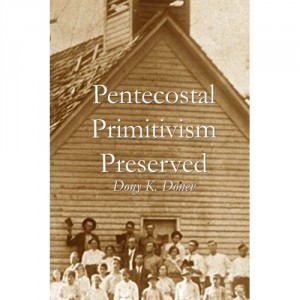
FURTHER READING:
Church of God (Cleveland, TN)
- Alive, alive! (A personal testimony)
- Church of God Primitivism
- Bulgarian Church of God
- J.W. Buckalew
- Why revival came? by Dr. Charles Conn
Azusa Street Revival of 1906
- Lucy F. Farrow: The Forgotten Apostle of Azusa
- The FORGOTTEN ROOTS OF THE AZUSA STREET REVIVAL
- Azusa Street’s Apostolic Faith Renewed
- Azusa Street Sermons
- Pentecostal Primitivism Preserved
Prior to Azusa Street Revival of 1906
- First person to speak in tongues in the Assemblies of God was William Jethro Walthall of the Holiness Baptist Churches of Southwestern Arkansas
- The Work of the Spirit in Rhode Island (1874-75)
- Speaking in Tongues in America Prior to the Azusa Street Revival
- WAR ON THE SAINTS: Revival Dawn and the Baptism of the Spirit
- How Jezebel Killed One of the Greatest Revivals Ever
The message of PENTECOST is still the same…
June 1, 2020 by Cup&Cross
Filed under Featured, News, Publication
Since the beginning of the 21st century, only 6-10% of new born believers in America receive the Baptism with the Holy Spirit, which by 2018 has resulted in:
- Over 60% within Global Pentecostalism do not speak in tongues
- A major doctrinal shift within Pentecostal Theology today claims speaking in tongues is not the only evidence of Holy Spirit Baptism
- Some theologians even claim there is no initial evidence in the Bible
- Others today go further to believe that no outward sign of the Holy Spirit baptism is necessary.
For this reason, WE are re-committing ourselves and ministry to revival and restoration of the Pentecostal Message through praying, fasting and preaching:
- Salvation of the sinner’s soul and entire sanctification through the Blood of Jesus
- Baptism with the Holy Spirit and fire with initial evidence of speaking in tongues
- Supernatural gifts and ministries of the Holy Spirit
- Healing, deliverance and signs following
- Pre-Millennial return of Christ and pre-Tribulation Rapture of His Church to glory
Please consider the URGENCY of this generation!
Let us reason together what can we do to prevent this rapid decline in Biblical spirituality.
Revival will not come without preaching!
Revival of Pentecost will not come without preaching the Message of Pentecost.
Speaking in Tongues in America Prior to the Azusa Street Revival of 1906
April, 1906 – The Azusa street revival swept the globe starting with California
January 1, 1901– The initial phenomenon of speaking in tongues occurred at Parham’s school in Topeka, Kansas
January 6, 1900 – Frank Sanford’s Shiloh school reported that “The gift of tongues has descended”
1896 – Over 100 people baptized in the Shaerer schoolhouse revival conducted by the Christian Union in the North Carolina mountains
1887 – People falling in trances and speaking in tongues were reported at Maria Etter’s revival meetings in Indiana
1874 – Speaking in tongues occurred during healing meetings reported in New York
1873 – William H. Doughty and the Gift People of Rhode Island spoke in tongues
1854 – V. P. Simmons and Robert Boyd reported tongue speaking during Moody’s meetings

FURTHER READING:
Church of God (Cleveland, TN)
- Alive, alive! (A personal testimony)
- Church of God Primitivism
- Bulgarian Church of God
- J.W. Buckalew
- Why revival came? by Dr. Charles Conn
Azusa Street Revival of 1906
- Lucy F. Farrow: The Forgotten Apostle of Azusa
- The FORGOTTEN ROOTS OF THE AZUSA STREET REVIVAL
- Azusa Street’s Apostolic Faith Renewed
- Azusa Street Sermons
- Pentecostal Primitivism Preserved
Prior to Azusa Street Revival of 1906
- First person to speak in tongues in the Assemblies of God was William Jethro Walthall of the Holiness Baptist Churches of Southwestern Arkansas
- The Work of the Spirit in Rhode Island (1874-75)
- Speaking in Tongues in America Prior to the Azusa Street Revival
- WAR ON THE SAINTS: Revival Dawn and the Baptism of the Spirit
- How Jezebel Killed One of the Greatest Revivals Ever
25 Years Ago in Chicago…
Exactly a quarter of a century ago today, I arrived in Chicago with a plan to start a Bulgarian church. That was my second trip to the Windy City after a mission’s trip with a few college friends in Christmas of 1994. The Narraganset Church of God in Chicago hosted us with great success and it was there I met several Bulgarians who desired to start a church. A key moment still remembered from 1994 was the “boot sermon.”
On Memorial Day weekend of 1995, I drove my Carolina baby blue Buick Grand National exactly 777 miles north to Chicago. It was still the time of no GPS or phone navigation so the only thing I had to go buy was an old atlas. Not knowing a better way just yet, I didn’t take the North-West Suburbs but exited on North Avenue and ended up driving its whole length through the city. On a warm Sunday the entire population of Wicker Park was in the streets. It was like in the movies. So was the rest of the Summer of 1995.
I had made little arrangements for my stay and ended up with a Bulgarian family living on Jackson Blvd. For the lack of space, I slept on an old couch on their balcony. Yes, during the Chicago heat wave of 1995.
I stayed with the pastor’s family a lot, especially when we started our 5 a.m. prayers in the church for members who would stop by to be prayed for before going to work. Some of those nights I just stayed at the church and slept on the first pew before the altar. It was there one early morning God woke me with the whole Gospel of John open before me, which later became the plan for my Bible translation.
As to the start of the Bulgarian church in Chicago, it came naturally as part of the ministry. The small band of Bulgarian believers would come for the English-speaking morning worship and then stay for a Bulgarian service in the early afternoon. A Spanish-speaking service followed at 4 P.M. as well. Several key events through the summer like the now-traditional Bulgarian 4th of July picnic in Chicago and a block party organized by the Narraganset Church of God helped spread the word of our Bulgarian ministry. Soon migrants of all ages began attending the afternoon services.
The most I remember from those services was prayer. Yes, I preached and there were guest speakers as well, but we mostly prayed. Bulgarians of all ages would come to the alter with their life pain and needs. Deep hurt within immigrant hearts, missing family members left behind in the old country, new struggles with work and existence in their new migrant reality and so on – all became a part of the new life of the Bulgarian church in Chicago. And those prayers were answered one by one. People did not come to attend or become members of a church plant project. They came and found answer to their prayers, direction in their lives and healing for their deep pain. Hidden from everyone else in Chicago, a river of pain flowed at those old church alters and a rain of healing, hope and peace filled the emptiness in those emigrant souls. That much I do still remember.
Through the whole summer as the Bulgarian church in Chicago began, I wrote my parents every Friday. Two regular stamps were what it took for a letter to get to Bulgaria back then. I would walk from the church on Narraganset across the street to Grand and drop the letter in a blue street U.S. mailbox. They all got to their destination. My dad had stored them all in an old shoe box after reading them, and I was able to find them all recently. They ain’t no diary, but still tell the story with details of each week of those humble beginnings. Along with the letters, there were a lot of pictures I had taken with my small 35mm. camera that looked more like a taser. The Metro, Sear’s Tower and under it where we ministered to the homeless, South Side and Cabrini Green, Rigley Field and Comiskey Park, McCormick and LSD. I only wish I had taken better notes now that I am writing this book. Times, places and faces are often mixed and sometimes lost in the timeline, but the story is far from forgotten. Now, a quarter of a century later, it is time to tell this story and tell it right… for the generations.
2020 Drive Thru Alternative COVID Friendly VBS Ideas
This year churches are having to resort to unique ways of ministry. We are doing a great job reaching our adults and being creative with virtual, online experiences for the kiddos to stay connected, but kids need routine and consistency of years pasts. Our kids will be looking forward to their annual VBS in-person experience. So let’s not let them down. Let’s put our heads together to give them the best VBS they will remember for years to come beyond cyberspace.
Here are some ideas:
- Have a one night drive thru experience where volunteers dress up as biblical characters to share the Roman’s Road to Salvation at difference stations throughout parking lot
- Have church members act out skits each night of the week and families can watch from car
- Do a drive thru at church where each night families can come and pick up VBS packets to take home and accomplish next day together
- Do a Trunk or Treat type VBS
- Perhaps do a scavenger hunt where you hide large cutouts around property that go along with a bible story
- Partner with a radio station in which families can tune and hear word and song from car
- Do a VBS in the style of a single scene live nativity
- Watch a Christian movie together at a local drive-in theater or a theater you create
- Could do some type of outdoor social distancing praise time and story or testimony
What are some ideas you have for your church? Please share so we can reach our kids with the greatest story in the world. Don’t cancel VBS this year because we are too emotionally overwhelmed or too busy. Let’s be the rock they need in this time of uncertainty. We were made for such a time as this.
Children’s Coloring Cookbook
 Kariyana’s Kitchen: Children’s Coloring Cookbook
Kariyana’s Kitchen: Children’s Coloring Cookbook
A coloring cookbook for children with recipes, blank cards, conversion charts and more!
- Paperback: 37 pages
- Publisher: Independently published (November 28, 2019)
- Language: English
- ISBN-10: 1704006821
- ISBN-13: 978-1704006826
- Product Dimensions: 6 x 0.1 x 9 inches
Joint Statement by President of the United States Donald J. Trump and Prime Minister Boyko Borissov of Bulgaria
November 30, 2019 by Cup&Cross
Filed under Featured, Missions, News, Publication
We, the President of the United States and the Prime Minister of Bulgaria, reaffirm the strong friendship and alliance between our two countries. As friends and Allies, we dedicate ourselves to deepening our security cooperation and to promoting economic growth and prosperity for our two great nations. Today, we are announcing measures intended to strengthen the strategic partnership between the United States of America and the Republic of Bulgaria.
The principal goal of our relationship is to strengthen the transatlantic community as a community of nations, united by shared sacrifice and a commitment to common defense, democratic values, fair trade, and mutual strategic interests. Thirty years ago, with the end of the Communist dictatorship, Bulgaria freely chose a transatlantic orientation. Fifteen years ago, Bulgaria reaffirmed its transatlantic Western choice when it became a NATO Ally.
The United States commends Bulgaria’s leadership and commitments to burden sharing, exceeding two percent of gross domestic product for defense spending this year. Bulgaria also plans to meet its longer-term NATO defense spending pledge by 2024. Our militaries stand together in the defense of freedom and look to reinforce our defense and deterrence posture across NATO’s eastern flank, including in the Black Sea, which is critical for Euro-Atlantic security. The United States and Bulgaria have derived mutual benefit from combined training and other U.S. operational usage of Novo Selo Training Area and Graf Ignatievo Air Base in Bulgaria, and intend to explore ways of furthering our combined training opportunities in the future. The United States and Bulgaria also intend to continue cooperation on the destruction of excess conventional weapons.
The United States commends Bulgaria’s recent purchase of eight F-16 aircraft and its efforts to modernize its armed forces. Bulgaria thanks the United States for its support in this acquisition. The United States and Bulgaria plan to deepen our defense technology and industry partnership. We commit to pursuing additional defense technology and industry partnerships in areas that are critical to regional defense and deterrence, including by continuing to facilitate access to high-end defense technologies and armaments that the United States deems available. Bulgaria commits to provide due consideration to proposals from U.S. defense companies who wish to compete in the Bulgarian market.
The United States and Bulgaria understand that energy security is national security. We underline our common understanding that the diversification of energy sources is a guarantee of energy security, independence, and competitiveness for our economies. Recognizing Bulgaria’s interest in moving toward more efficient and cleaner sources of energy, we will cooperate on increasing the supply of gas from diverse and reliable sources and diversifying the nuclear energy sector. To this end, the United States intends to send a technical team to Bulgaria to work with Bulgarian counterparts to explore the possibilities for further cooperation in different areas of energy, including nuclear. We share the view of only developing energy projects which have a clear economic basis or commercial need. The United States and Bulgaria also plan to work together to enhance Bulgaria’s energy security by supporting expeditiously the licensing and use of American nuclear fuel for the Kozloduy nuclear power plant, in strict compliance with the safety and diversification requirements and the rules of the European Union.
We welcome Bulgaria’s aspirations to become a regional natural gas hub by completing the Interconnector Greece-Bulgaria, taking a stake and booking capacity in Greece’s Alexandroupolis floating storage and regasification unit, liberalizing its domestic gas market, expanding gas storage capacity and access, working with Serbia to build another interconnector, and investing in the reverse flow capacity of the Trans Balkan Pipeline to diversify Eastern Europe’s gas imports in compliance with the rules of the European Union. These steps together will significantly enhance Bulgaria’s energy security, lower energy costs for the Bulgarian consumer, and make Bulgaria an energy leader in the region.
We also share a desire to work together through multilateral fora, especially via the Three Seas Initiative and the Partnership for Transatlantic Energy Cooperation, to promote regional development, including via the expansion of vital energy, transportation, and digital infrastructure. Taking into account that secure Fifth Generation (5G) wireless communications networks will be vital to both future prosperity and national security, the United States and Bulgaria declare the shared desire to strengthen cooperation in this field.
The United States supports Bulgaria’s recent efforts to defend the country’s independence and sovereignty from malign influence. We support the long-term efforts of the institutions and agencies involved in investigating and exposing violations of Bulgarian law by foreign malign actors, and we affirm Bulgaria’s right to chart its own future.
We stress that good governance and the rule of law form the basis of our shared security and prosperity. The United States welcomes Bulgaria’s ongoing efforts regarding economic reforms, best practices, and a regulatory framework in pursuit of compliance with international standards, including those of the Organization for Economic Cooperation and Development (OECD). Bulgaria underscores its desire to begin the OECD accession process as soon as possible.
The United States encourages Bulgaria to further address corruption that hinders faith in public institutions and economic growth. The United States strongly supports media freedom everywhere, since a free press is essential to democratic nations, and encourages Bulgaria to further protect media freedoms.
The United States and Bulgaria proudly underscore the trade and investment ties that link our two countries and our common interest in shaping an investment climate that offers transparency, predictability, and stability, as well as a level playing field for our respective companies. We commit to the principle of fair treatment of investors, to resolving any investment disputes by good-faith negotiations, and to expanding bilateral trade. We also intend to work together to determine when it would be feasible to enter into a Social Security Totalization Agreement. The United States supports Bulgaria’s aspiration to join the Visa Waiver Program and welcomes Bulgaria’s continued progress toward meeting the statutory requirements for designation as a program partner.
The United States and Bulgaria commit to conducting a regular strategic dialogue between our two nations in 2020 and beyond.
Bulgaria Won’t Be Part of NATO Fleet in Black Sea, Premier Says
Bulgarian Prime Minister Boyko Borissov rejected a Romanian call for North Atlantic Treaty Organization to set up a permanent Black Sea fleet in response to Russian aggression in eastern Ukraine on grounds it will increase military tension and hurt tourism. Romanian President Klaus Iohannis discussed with Borissov and Bulgarian counterpart Rosen Plevneliev proposing the joint initiative that would include Romania, Ukraine, Turkey and Bulgaria, at a NATO summit in Warsaw in July. Borissov said the move would “turn the Black Sea into a territory of war” and that he “wants to see cruising yachts, and tourists, rather than warships.”
“To send warships as a fleet against the Russian ships exceeds the limit of what I can allow,” Borissov told reporters in Sofia on Thursday. “To deploy destroyers, aircraft carriers near Bourgas or Varna during the tourist season is unacceptable.”
Russia’s 2014 takeover of Crimea and proxy war in eastern Ukraine near NATO territory led the U.S. to rotate troops into eastern Europe and prompted the alliance to set up a 5,000-man rapid-response force that can mobilize within days. To allay fears in former Soviet-bloc nations that they’re vulnerable to attack, the alliance decided this week to deploy a multinational group of 4,000 troops in Poland and the three Baltic nations, all of which border Russia.
According to a 1936 Montreux Convention, countries which don’t have a Black Sea coastline can’t keep their warships there for more than 21 days. NATO members Turkey, Romania and Bulgaria are all Black Sea basin countries. Russia has its own Black Sea Fleet based in Crimea.
Bulgaria hosts a U.S. base, takes part in joint NATO military drills and has troops in Afghanistan, Borissov said. The government is prepared to send 400 ground troops on rotational training as part of NATO brigade that may be deployed in neighboring Romania, he said. The European Union’s poorest state plans to spend 2.3 billion lev ($1.3 billion) to replace outdated Soviet-era armament with new warships and fighters jets.
Bulgarian resorts, spread along the 350-kilometer (217 mile) Black Sea coastline made the bulk of the 2.9 billion-euro ($3.25 billion) tourism revenue last year, or 11 percent of economic output.
“Russia won’t attack Bulgaria with tanks and missiles,” Borissov said citing historical ties based on the Christian Orthodoxy religion the two countries share. “Their actions on Bulgarian territory are different, mostly economic.”
Bulgaria will ask NATO ships to guard the Bulgarian coast only in the case of “a huge refugee wave crossing the Black Sea, should their route across the Aegean and the Mediterranean be closed,” Borissov said, referring to the migrants seeking refuge in western Europe amid continuing war in Syria.
2019 Bulgarian Elections Continue the Same Political Trajectory for 2020
2019 Bulgarian Elections Continue the Same Political Trajectory for 2020
- Over 1.9 Million People Voted with Ballot, Nearly 160 Thousand – with a Machine
- Newly Elected MEPs to Joint Action on the Mobility I Package
- Names of All 17 New Bulgaria’s MEPs Became Clear Late Last Night
Our preliminary impressions of the political and economical situation in Bulgaria were based on the recent acceptance of the country into NATO and its anticipated admission into the European Union in 2007.Immediately before our arrival, the elections were won by the Socialist party which brought extra tension to the country, although less than 50% of the population participated through their votes.
The Bulgarian Christian Coalition, representing Evangelicals, won only 21,000 votes while struggling to remain politically active. Nationalistic urges among political circles were also common.
Violent public executions among underground cartels have become a normal event in Bulgaria’s everyday reality. The economy has also been dramatically affected as over 90% of the population lives on the verge of poverty. The price of gas grew in the fall and led to the increase of the cost of food, electricity and travel. Various evangelical churches, some of which are pastored and attended by friends of ours, were targeted by the media. Articles against them infiltrated many evangelistic activities among Romani and other minority communities.
These media attacks remind of similar anti-protestant campaigns during 1990-93. Hopefully, this time, the evangelical churches may be prepared to respond adequately.
As we have previously proposed, this puts Bulgaria back on the “Red Light of 30 Years of Communism…” as in 2013, 2014, 2015, 2016, 2017, 2018, 2019 and 2020…
Government Elections in Bulgaria (2005-2019):
 2005 Parliamentary Elections
2005 Parliamentary Elections
2006 Presidential Elections
2007 Municipal Elections
2009 Parliamentary Elections
2009 European Parliament elections
2011 Presidential Elections
2011 Local Elections
2013 Early parliamentary elections
2014 Early Parliamentary Elections
2015 Municipal Elections
2016 Presidential election
2017 Parliamentary elections
2019 European Parliament election (23-26 May)
2019 Bulgarian local elections
2019 Municipal Elections
The Legacy of Dr. Nicholas Nikolov and the Bulgarian Pentecostal Union
Dr. Nicholas Nikolov passed to Glory on November 6, 1964. After his death, his wife Martha visited Bulgaria twice in 1976 and 1978, the second time for the 50th anniversary of the Pentecostal Union there where their legacy is strongly remembered to this day.
 The organizational talent of Nicholas Nikolov applied with the Pentecostal movement in Bulgaria shaped the history and set a course for the next century. A study on his role and leadership cannot be completed without pointing to the key factors of his ministerial and organizational success despite the divisions present in the Union.
The organizational talent of Nicholas Nikolov applied with the Pentecostal movement in Bulgaria shaped the history and set a course for the next century. A study on his role and leadership cannot be completed without pointing to the key factors of his ministerial and organizational success despite the divisions present in the Union.
After reviewing Nikolov’s work in Bulgaria, it is becoming clear that it was not the cause for a split among Bulgarian Pentecostals in 1928 as often held. The official registration of the new organization simply confirmed a deepening division that had began with the very start of the movement. More important for us today are the factors that helped Nikolov establish, grow and ensure the future of the Pentecostal organization, while many older and more experienced Bulgarian leaders failed and lost their rightful place in history.
Firstly, what other nucleases within early Bulgarian Pentecostalism lacked in comparison with Nikolov’s Union, was the strong support from abroad (educational, financial and otherwise). It proved indispensable in the Bulgarian context of ministry shaped by deep economic crises and spiritual hunger after WWI. Nikolov found way to implement this advantage effectively in areas where the few before him did not succeed.
Based on his strong relationship with Assemblies of God headquarters in Springfield came the clear articulation of doctrinal understanding expressed in a written statement of faith and praxis. In all fairness, neither faith nor praxis borrowed from the American Assemblies of God fit perfectly the primitive Pentecostalism of Bulgaria in 1928. But as the Union grew into a nationwide organization, more useful applications of organized life were replicated even after Nikolov had left Bulgaria for good.
Then comes the very strong and effective educational and discipleship vision for denominational growth (also borrowed from the American Assemblies of God). Other Pentecostal groups in Bulgaria were too formed around strong leaders, but as most of them remained in leadership for life their spiritual strength and vision naturally weekend. While the work of the Spirit and the practice of gifts were central among them, any formal education or even basic training in practical ministry and organizational leadership were disregarded as worldly having no place in the Church of God. With this mentality prevalent, many Pentecostal groups did not survive after the passing of their first generation of leaders and disappeared from history – either assimilated by the Pentecostal Union or lost forever.
In contrast, Nikolov gave special use of strategic organizational structure that aided the work of the Spirit and empowered the Pentecostal churches. He also found ways to invest in the development of trained leaders able to build and lead the Union until his initial vision was fulfilled. In the process, some congregations did loose spirituality while gaining more structure and training. But overall, a healthy balance was reached ensuring a growing and spiritual Pentecostal denomination.
Lastly, the decision to comply with government legislation opened doors to cooperate with other Protestants organizations on a national level. This decision brought constant tensions that had to be carefully weighed. Siding with churches of the Bulgarian Evangelical Alliance, many of which subscribed to liberal theology, was seen by the older believers as compromising of the Pentecostal faith. Yet, it gave the young Pentecostal movement much needed credibility.
In a similar matter the government registration, provided a nationwide representation of Pentecostals in religious life and opened doors for renting auditoriums, building sanctuaries and creating a national network of self-sustained churches. Some older Pentecostals still saw this as compromising with the world and an unforgivable sin. Especially when the Communist Regime took over Bulgaria in 1944, most leading Protestant pastors were sentenced to life in prison and their place in the pulpit was filled by government paid agents, who infiltrated the decision making body of the Union and enforced government mandate over the churches.
But it also helped the Union churches survive the Regime and be among the few allowed to have regular meetings and services making them the largest evangelical group in Bulgaria today. Nikolov was right with his decision that a small band of organized Pentecostals was much stronger than any other divided majority. And that empowering Spirit-filled communities with organizational structure and leadership mandate can earn their rightful place in history.


